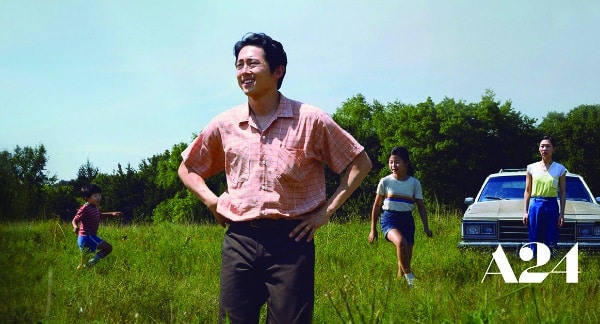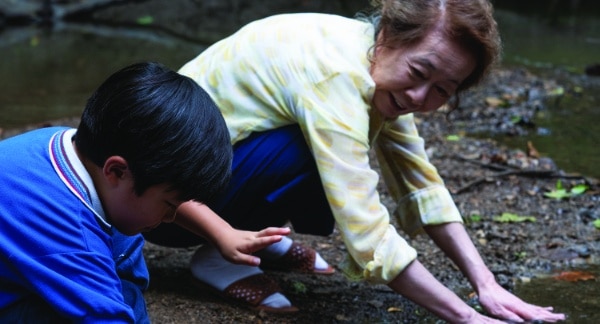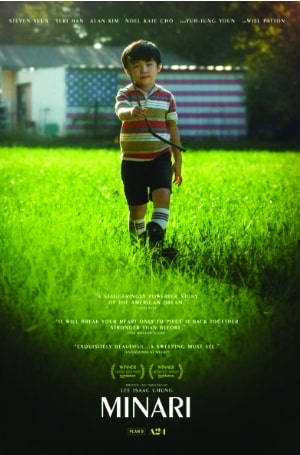The pastoral lushness of the cinematography and the simplicity of the story veils so much depth of humanity about a Christian family pursuing a dream and life together, in this 2020 Sundance Audience Award and Grand Jury Prize winning film, Minari. Director/writer Lee Isaac Chung presents a loosely autobiographical and profoundly challenging but beautiful story of a Korean American family seeking to start their own farm in Arkansas after leaving urban life in California in the 1980s. Says Chung: “For me, the film comes down on the side of hoping for the best in each other. The thing I most wanted was to let people into this family’s world with sincerity and honesty, and without judgement of anyone in it.”
Jacob (Steven Yeun) and his wife Monica (Han Ye-ri) left Korea in order to pursue Jacob’s desire to be a landowner and farmer. Their children, Anne (Noel Cho) and David (Alan S. Kim) a precocious seven-year-old boy, are excited to begin a new life on the farm. When they arrive, they only have an old trailer to live in, untilled land all around them and no water source nearby. An image of Jesus on the inside of the trailer points to some deeper symbolism in the film.

Monica worries about her son who was born with a heart condition and is always telling him, “don’t run” or “slow down,” something difficult for a young boy. This concern adds to her tension with Jacob about the conditions of their poverty-stricken life, even though they are a faith-filled family who regularly attend a church in town. Monica’s faith is what holds the family together. Her belief in God, as Youn Yuh-Jung says, is what she holds on to in the midst of their struggles.
Jacob begins his farm by looking for a place to dig a well with the assistance of David whom he tenderly teaches about life and the land. Refusing the services of a well diviner, he tells David, “Never pay for anything you can find for free” as they strike water after digging. A religious homeless vet with strange exorcism abilities, Paul (Will Patton) joins them in prepping the land for planting. His presence is one of religious fanaticism but also truth. He helps Jacob see something deeper about life and the land which they till together.
As an income source, both Jacob and Monica work at the local hatchery while toiling on their farm in between shifts. Since the children have no one to look after them, they bring Monica’s mother, Soon-ja (Youn Yuh-jung) from Korea. She shares a room with David who refuses to be near her saying, “Grandma smells like Korea.” He avoids her because she doesn’t hold up to his imagination of what a grandma should be, since she plays cards, watches wrestling, swears, and tells him he’s a “pretty boy” in her broken English to which he angrily corrects her, “I’m not pretty! I’m good-looking!” This relationship gives spice and humor to the story. As Youn Yuh-Jung says jokingly, “Alan didn’t have to like me since I was a stranger to him during filming,” which made it easier for him to react as he did in the film. She continues, that the grandmother, “had a mission…. She sold her house and small business in Korea to pay for David’s medical needs” and this bond was deeper right from the beginning but only grew as he began to accept her.

As Soon-ja bonds with the children, she brings them to the creek to plant minari seeds, an Asian vegetable, and instructs them on the benefits of the plant. In the meantime, Jacob’s well runs dry—a reference to the biblical well where Jesus speaks with the Samaritan woman promising her a well that never runs dry? Perhaps. But, at the moment, Jacob’s prospects diminish when a Dallas produce buyer cancels his order last minute leaving them desperate. Paying for water leaves them less profit causing even greater marital tension between Jacob and Monica.
After suffering a stroke, grandma stays at home when the family goes into town for David’s doctor’s appointment. Tragedy strikes and the family must decide if they come together in a bond that supersedes all material situations. A surprising grace is discovered that offers hope and a future.
With simplicity and tenderness, this lovely story strikes at the heart of what it means to be a family. Youn Yuh-Jung shared that family in Korean culture is very important and intimacy with family is shown through sacrifice and attention to duty, something this film shows so beautifully. At the same time humorous and dramatic, Minari opens the soul to nature and to God while offering a profound look into life’s everyday challenges. Grace is always dancing in the midst of those sufferings if we but open our eyes to notice the blessing of the moment. Throughout the film, the unassuming details point to the grace of God at work in our lives and in our hearts, and most especially in the family.
In theaters starting February 12th and streaming services February 26th.



